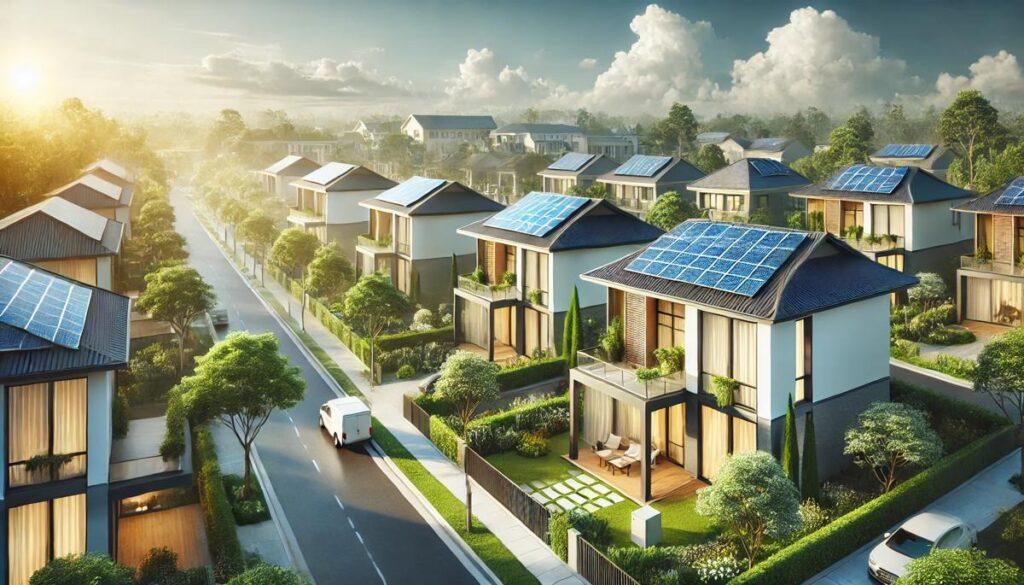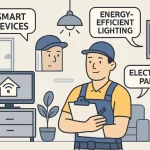As more homeowners and businesses turn to renewable energy sources, solar power is emerging as one of the most popular options. Yet, despite its growth and the proven benefits, solar energy is surrounded by myths and misconceptions. From concerns about efficiency to misunderstandings around cost, these myths can cloud judgment and prevent people from exploring solar power’s true potential: it can transform your home into a power house of your very own! This article aims to dispel the ten most common misconceptions about solar energy, shedding light on the real facts and encouraging informed decision-making.
- Myth #1: Solar Panels Only Work in Sunny Climates
Fact: Solar panels are effective in various climates, not just sunny regions. They actually generate power from light, not heat, which means they can function efficiently in colder or even cloudy environments. In fact, solar technology is often more efficient in cooler temperatures since extreme heat can reduce the system’s output. Countries like Germany and the UK, known for overcast skies, are leading solar energy adopters, demonstrating that solar is viable beyond sunny locations.
- Myth #2: Solar Energy Is Too Expensive for the Average Homeowner
Fact: Solar energy costs have dropped dramatically in recent years, making it much more accessible. The price of solar panels has fallen by around 70% over the past decade, and government incentives or tax credits can offset installation costs further. Many financing options, like solar leases or power purchase agreements, reduce or even eliminate upfront expenses. With rising electricity costs, investing in solar often results in long-term savings, proving that solar is increasingly affordable for many households.
- Myth #3: Solar Panels Require Constant Maintenance and Upkeep
Fact: Solar panels require very little maintenance. They’re designed to be durable, with most systems coming with warranties that last 20-25 years. Routine checks and the occasional cleaning are usually enough to keep them functioning optimally. Solar panels have no moving parts, which means less wear and tear over time. Some companies also offer monitoring systems, allowing owners to track the panel’s performance remotely, making maintenance even simpler.
- Myth #4: Solar Power Isn’t Reliable Compared to Traditional Energy Sources
Fact: Solar power systems can be highly reliable and effective. With advancements in battery storage, solar energy can be stored for use during nighttime or cloudy days, ensuring power availability when it’s needed most. Additionally, most systems remain connected to the grid, so they continue to receive electricity if solar power isn’t generating enough. This hybrid approach offers a dependable energy supply that’s sustainable and, in many cases, even reduces reliance on the grid.
- Myth #5: Solar Panels Are Harmful to the Environment
Fact: Solar energy is one of the most environmentally friendly power sources available. While manufacturing solar panels requires some resources and energy, the carbon footprint of solar is significantly lower than that of fossil fuels over the panel’s lifespan. Modern recycling techniques for solar components also reduce environmental impact. Choosing solar energy helps reduce greenhouse gas emissions, contributing to a cleaner and more sustainable environment overall.
- Myth #6: Solar Energy Will Deplete on Cloudy Days or at Night
Fact: While solar panels produce less energy on cloudy days, they continue to generate power as long as there’s daylight. Battery storage allows for energy to be saved for later use, including nighttime hours. Alternatively, most solar systems are grid-tied, which means any shortfall from the panels is supplemented by traditional electricity sources, making solar energy a viable option around the clock.
- Myth #7: Installing Solar Panels Will Damage Your Roof
Fact: Professionally installed solar panels should not damage your roof. In fact, they often extend roof life by protecting it from harsh weather. Proper installation includes mounting brackets that ensure a secure attachment without harm. The added layer of panels can help insulate and protect your roof, reducing wear and tear over time. Choosing a reputable installer ensures that the roof remains intact and that all structural considerations are addressed.
- Myth #8: Solar Technology Is Too New to Be Trustworthy
Fact: Solar technology has been around for decades, with consistent improvements making it one of the most reliable energy sources. The industry has made strides in efficiency and durability, backed by extensive research and rigorous testing. With a typical warranty of 20-25 years and numerous successful installations worldwide, solar panels are not only trustworthy but have a proven track record of performance and longevity.
- Myth #9: Switching to Solar Will Eliminate Your Energy Bills Entirely
Fact: While solar can significantly reduce electricity bills, they won’t necessarily eliminate them unless you live entirely off-grid. Solar energy usage depends on factors like system size, location, and household energy consumption. Additionally, grid-tied systems may still incur minimal connection charges. Nonetheless, solar energy can drastically lower monthly energy costs, and some homeowners even receive credits for excess energy generated and fed back into the grid, further reducing expenses.
- Myth #10: Solar Panels Are Ineffective in Colder Temperatures
Fact: Solar panels work based on sunlight, not heat, and are often more efficient in cooler temperatures. Excessive heat can reduce their performance, so panels installed in colder climates may even generate more electricity in certain conditions. In snowy regions, snow can slide off angled panels easily, allowing them to continue functioning once cleared. This myth overlooks that cold, sunny days can offer excellent solar production.
- Conclusion
Solar energy holds immense potential for individuals and communities, but persistent myths can prevent people from realizing its benefits. By understanding the facts behind common misconceptions, homeowners and businesses can make better choices and explore sustainable energy confidently. Solar is not just a future energy solution but a viable, effective option today. As we debunk these myths, it becomes clear that solar energy is not only beneficial but also a practical choice for an eco-conscious, cost-effective lifestyle.







